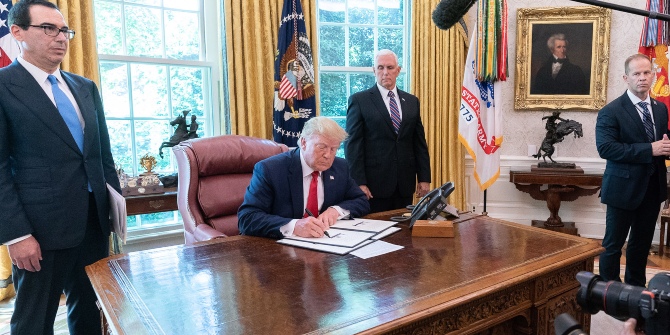
 The rising domestic demand for oil raises China’s concern with energy security. As part of a plan of economic reforms, the country has been increasing its strategic petroleum reserves, as well as opening its markets and internationalising its currency, the renminbi. Ding Chen and Umar Muhammad Gummi write that an international renminbi helps China’s oil security.
The rising domestic demand for oil raises China’s concern with energy security. As part of a plan of economic reforms, the country has been increasing its strategic petroleum reserves, as well as opening its markets and internationalising its currency, the renminbi. Ding Chen and Umar Muhammad Gummi write that an international renminbi helps China’s oil security.
China has recorded tremendous achievements in its move to internationalise its currency, as part of a series of economic reforms, including the opening of markets and promotion of trade and investment.
According to SWIFT, the renminbi is now the fourth most used currency in global payments, up from 35th in October 2010. It rose to 3.2 per cent of international payment settlements in January 2021, breaking a record set in 2015. Its cross-border settlements grew 26.1 per cent in 2021 to 31.1 trillion RMB ($4.50 trillion), supporting the country’s state-owned companies, commodity traders and engineering contractors, which could now use their domestic currency for settlement and financing.
Some scholars argue that the internationalisation of the renminbi has the potential to change the current invoicing and currency system in the global oil market (see Campanella, 2014; Yuan, 2016; Kurean & Geoxavier, 2020). As the market expands, the pricing of crude oil is moving beyond the dollar-based pricing system and towards different currencies over time.
RMB internationalisation-related research is gaining momentum. However, how currency internationalisation relates to energy security in China is still contentious among researchers. Recent studies have examined potential effects on energy prices, oil trade, and oil and gas security (see Chen et al., 2022). The binding power of energy trade, pricing and settlement is the starting point for the rise of international commodities, such as the 19th-century sterling system for coal and the 20th-century petro-dollar system. These two systems show that there is a theoretical link between currency internationalisation and the energy market (see Krugman, 1983; Amano & van Norden, 1998; Engel & West, 2005; Chen et al., 2016).
In our research, we found a bi-directional causality between petroleum security and the internationalisation of the renminbi. This implies that in the short run, currency internationalisation can predict the future of petroleum security in China, and vice versa. This positive causal effect sheds more light on the increasing demand for petroleum resources, which further raises the level of oil imports.
Towards a multipolar currency system
The 2008 financial crisis that erupted in the US created a new round of debates on the need to transform the global monetary system. The dollar reserve system has been logically criticised for its excessive privileges, which not only cause financial instability but also exacerbate inequality between rich and poor countries (see Zhou, 2009; Stiglitz, 2009).
Various reform proposals, such as a return to the gold standard, the creation of a single world currency, using special drawing rights and improving the US dollar standard have been debated and submitted. However, a sizable number of economists believe that a multipolar currency system is the most realistic development because currency competition makes any reserve currency’s issuing country more responsible and disciplined in its monetary and other macroeconomic policies, which could eventually lead to a more stable global monetary system.
The role of uncertainty
Economic policy uncertainty, such as the one caused by the COVID-19 pandemic and the Russia-Ukraine war, exerts significant influence on petroleum security and its connection with RMB internationalisation. Authors have argued that policy uncertainty reduces total import potential and increases trade costs, leading to a rise in commodity prices. This uncertainty can directly and indirectly affect currency and petroleum markets by influencing the decisions of economic agents regarding energy consumption and energy mix. Energy consumption and mix are further linked to government decisions to adopt policies to improve energy security, petroleum trade regulation and settlement methods.
The causal effect we found between RMB internationalisation and petroleum security stands also in times of uncertainty. This is evident in recent developments in petroleum trade between China and other countries (Iran, Russia, Pakistan, Kuwait and India). China’s net oil import is on the rise. With the increasing acceptance of the RMB in petroleum invoicing, the country finds it comfortable to import to meet the rising demand. This will affect domestic oil prices in the long run. Accordingly, energy security in China is a supply phenomenon and currency internationalisation can predict changes in security at least in the short run.
The recent increase in China’s Strategic Petroleum Reserve (SPR) through oil trade is linked to the currency internationalisation process. The country expanded the potential reserve storage capacity from 26.8 million m3 (169 million barrels) in 2014, to more than 80 million m3 (500 million barrels) in 2017/2018. Building strategic reserves is among the key petroleum security strategies in China as spelled out in the country’s 12th five-year plan.
Conclusions
Our study suggests a comparative advantage for China in oil trade, increasing the level of its petroleum reserves amid global uncertainty and meeting the rising oil demand that threatens the country’s energy security drive. With a sustained RMB internationalisation process, oil companies in China could have an incentive to invest in the petroleum market, since they can now minimise global market fluctuations.
The downside is that RMB internationalisation may complicate China’s monetary policy and limit its effectiveness and independence. This cost is considered the main challenge for an international currency. Mundell (1961) described it as the “impossible trinity” of an open economy, meaning that no country can simultaneously reach the policy goals of free capital movement, exchange rate stability, and independent monetary policy.
- This blog post is based on The role of Renminbi internationalization in China’s petroleum security: a causal analysis amidst global uncertainties, Journal of Chinese Economics and Business Studies (October 2023) and first appeared at LSE Business Review.
- Featured image provided by Shutterstock.
- Please read our comments policy before commenting
- Note: The post gives the views of its author, not of USAPP– American Politics and Policy, nor of the London School of Economics.
- Shortened URL for this post: https://bit.ly/48mFFuX






